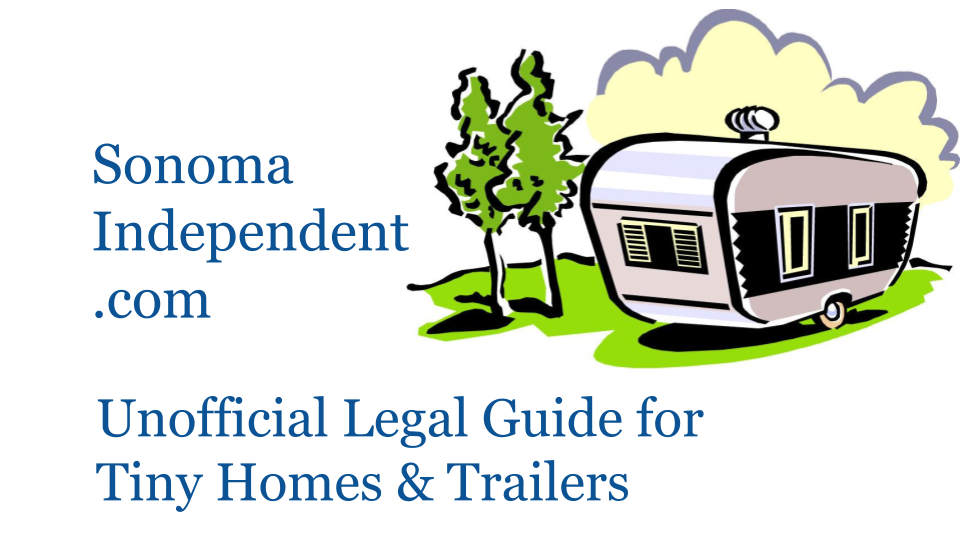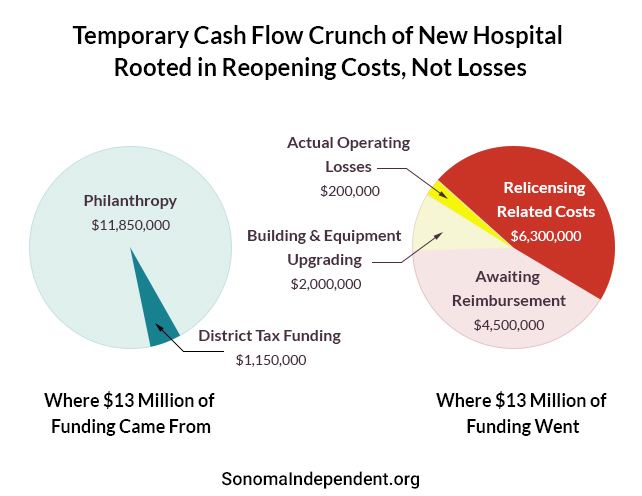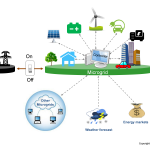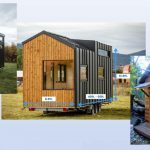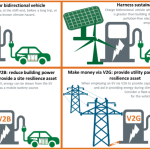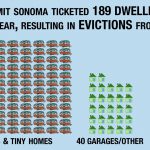Earth Day 2023 arrives with exciting good news for thousands of lower income renters in Sonoma County whose ecologically low impact tiny homes and trailers were previously illegal.
Two major code changes now provide, for the first time, a pathway to legalization. The new Permit Sonoma code enforcement regulations, which took effect April 13, 2023, allows almost every property in unincorporated areas to host one tiny home or trailer, and allows the use of waterless toilets (The unincorporated area is everywhere in Sonoma County except within its nine cities).
The news comes with a few big challenges. The first is that only one temporary home can be permitted per property. The second is that hold & haul contracts can cost as much as rent for tenants who use a lot of water for their tiny homes and trailers.
The new code changes came about after a concerted, 18-month effort led by the Sonoma Independent to stop Permit Sonoma’s enforcement of building code rules that were causing nearly 200 people every year to lose their housing. Without these code changes, trailers and tiny homes were only allowed in very limited situations, and were always required to be connected to septic or sewer systems.
As we reported here, the intent of the Sonoma County Supervisors historic 5 to 0 vote last December 6 was to allow residents to remain in their safe and affordable alternative homes and not be made homeless. But because of broader state regulations, the new codes are far from ideal. As a result, the Sonoma Independent offers this unofficial grassroots guide to the new zoning law
Three tips to avoid code enforcement-ordered evictions and remain in your affordable tiny home or trailer:
1. Permits are good for one dwelling only. If you host more, ask forgiveness, not permission: If you are a property owner who wants to legally rent out only one trailer or tiny home and you do not have an ADU, applying for a permit under the new guidelines makes great sense and the Sonoma Independent encourages you to do so.
But if you are a property with more than one trailer, tiny home, RV, converted barn or ADU, you will not be able to obtain a permit for any of them unless all but one of your tenants is evicted.The Sonoma Independent has found that only a few percent, or a few hundred housing units, are issued violations each year as a result of an anonymous complaint to Permit Sonoma. This is out of what we have estimated are the 10,000+ people living affordably in alternative housing on the 66,000 unincorporated properties across the county. Many of the properties that rent trailers or tiny homes have a few tenants. To avoid the need to evict anyone, we recommend that property owners with multiple tenants not apply for a permit unless they are inspected and served with what amounts to a Permit Sonoma eviction order..
2. If a violation is served, DON’T PANIC: Tell the property owner they do NOT need to evict you, that you will work to cure the violation and that you have 30 days to do so. Sonoma County wants you to stay in your home. Legal Aid of Sonoma County cannot represent your property owner, but they might be able to represent you if you are a low income tenant renting a tiny home or trailer or land for it. They can be reached at (707) 542-1290.
3. Tips for securing a permit if you need one: If you aren’t connected to septic or sewer you will need a “hold and haul” permit for your wastewater and you will need to secure a 12-month contract with a pumping company to remove this waste. Proof of pumping will be required to renew your permit after one year. You will likely need to install a holding tank.
-Wastewater volume can be reduced by using a waterless toilet. When picking a waterless toilet option, know that incinerator toilets, although more expensive, have fewer requirements than compost toilets.
-With an incinerating toilet and a gray water system, the only wastewater your home will produce will be from the kitchen sink (in CA kitchen sink water is considered blackwater). Using your sink less could reduce hold and haul costs significantly.
The Fine Print
Any parcel in unincorporated Sonoma County that does not already have an ADU may apply for a 1-year “TEM” permit to place a single trailer or ANSI-certified tiny home on the property. Though these are 1-year permits, they can-and are likely to be- renewed every year. According to the county, it was necessary to limit the permits to one year in order to not run afoul of CEQA regulations. The Permit’s cost will be around $200. There are some small areas in the county where ADUs are not still allowed.
Waterless toilets are also allowed in TEM-permitted tiny homes and trailers, making Sonoma County the most forward thinking county in the state when it comes to waterless toilets. Compost and incinerating toilets have different guidelines. Incinerating toilets face fewer restrictions, but come with the added cost of either electricity or propane. These costs vary widely based on model and energy rates. Energy costs of incinerating toilets are likely to run between $50 and $200 per month depending on model and use.
If you choose a compost toilet you will need to participate in a county run monitoring program and will have to have your composted waste hauled off site.
Unfortunately, even if you use an incinerating toilet, the county still requires that black water from kitchen sinks be disposed of as hazardous wastewater. This means tiny homes and RVs or trailers will still need to be either hooked up to septic, sewer, or use a new option designated by the county for this program, called “hold and haul.”
The hold and haul option is a necessary and welcome alternative for people who are not near a sewer line or are unable to connect to septic systems due to the prohibitive cost of doing so. This hold and haul tank would store wastewater like a septic tank, but would not allow for drainage. The resident would then be required to contract with a pumping company to have the tank emptied on a regular basis. Pumping fees, however, are also expensive. The cost of a 12-month pumping contract will vary widely based on the type of equipment used in the trailer or tiny home and on the habits of the resident.
The tanks themselves range between $800 to $2,000 depending on size (300, 500 or 1,000 gallons are most typical) not including fittings and installation fees. It costs about $500 to pump a 500 gallon tank and $600 for tanks holding 1000 gallons.
At the low end of costs, a resident who is extremely careful with their water use, and who has an incinerator toilet and a greywater system for their shower and bathroom sink, could create just a few gallons of wastewater a day. If you only need to pump your 500 gallon tank twice a year, this would result in pumping costs of less than $100 per month. If someone never cooks in their home, they conceivably produce even less blackwater. But a holding tank and pumping contract would still be required in this case.
The county estimates that for the average trailer, emptying the hold and haul contract will cost as much as $500 or $1000 a month. This is a high estimate, but if the tiny home or trailer is using a flush toilet and the resident doesn’t practice strict water conservation, pumping could easily cost this much.
This high cost and related logistics (like diesel trucks idling on rural properties while pumping) is one reason that the Sonoma Independent questions whether it’s better for renters already living in safe alternative housing to consider not immediately applying for a permit.
So if you are already using a compost toilet and treat your kitchen sink water as gray water, following sustainable best practices, then applying for a TEM permit might not be your best option. It would likely cause you to have to install a holding tank and sign up for an expensive hauling contract. If there is more than one unit of alternative housing on the property, the county would force all but one residence to move.
The important good news, however, is that renters living in alternative housing who are cited by Permit Sonoma now have a legal option to stay in their homes for the first time. In the past, if connecting to a septic tank was not an option, there were no programs that could bring the residence into compliance. A cited residence had no viable options.
This was the case with Copperwoman, the tiny home grandma whose case last fall sparked these changes. If Copperwoman’s case happened today, she would have had the option to apply for a 1-year permit and install a holding tank for wastewater with a pumping contract.
It’s not a perfect solution, but with sky high rents for one bedroom units in Sonoma County, alternative housing is still more affordable than other housing options, even with the increased costs of the hold and haul program.
If you do decide to ask forgiveness rather than permission when it comes to the new permit and are eventually cited by the county, you will have 30 days to obtain a zoning permit and bring your dwelling into compliance.
Bradley Dunn, Policy Manager of Permit Sonoma responded to our email questions regarding what enforcement will look like with the new TEM program. He wrote, “There will be a cure period of 30 days to obtain a zoning permit. If the trailer or ANSI-certified tiny home is not served by on-site septic, a hold and haul contract would need to be in place within a week’s time and not pose a current health hazard.”
This means that if a complaining neighbor causes you to receive a visit from Permit Sonoma, you will have a 30 day period to apply for a permit. If you are not connected to septic or sewer, this timeline shortens and you would need to install the holding tank and secure a hauling contract within a week.
It isn’t a perfect solution. California’s laws regarding gray and black water treatment still stand in the way of compost toilets resolving the need for septic tanks in small footprint, alternative housing. Many other states consider kitchen sink water to be greywater. Especially in a rural area, when using best practices it is perfectly safe to treat kitchen sink water as greywater. There are a number of filtration options that render kitchen sink water safe, including small UV light devices. It’s also better for the environment; having a large diesel pumping truck drive long distances and sit idling while it pumps kitchen sink water is clearly a step in the wrong direction. But until state laws can be changed, pumping kitchen sink water is the only solution that allows people to live in homes that are not connected to septic or sewer.
Even with their significant shortcomings, these changes give more than 60,000 property owners living in Sonoma County’s unincorporated area the legal right to to rent out one trailer or tiny home. With the end of the previous enforcement process that caused 200 residents per year to be evicted from affordable safe housing, thousands of residents can breathe easier knowing that they aren’t one phone call to Permit Sonoma away from losing their homes.
Please note: While the Sonoma Independent strives to explain these rules and provide a clear guide for the public, everyone should make a decision based on their own circumstances. This is an unofficial guide. Property owners and tenants should seek professional legal advice if faced with code enforcement violations.
Resources for Alternative Housing
(707) 565-1900
Legal Aid cannot help property owners but may be able to assist tenants.
(707) 843-4432
Sonya Tafejian, Tiny House Consulting – Sonoma County
Sonya is available to advise on permitting needs. She has eight years of experience working with PRMD (Permit Sonoma) to obtain permits and remediate red tag issues. She is committed to helping create more truly affordable housing for folks in our county. Call for a free consultation. (707)779-9474 sonya_terri@yahoo.com
Greywater system tips from Sonoma County Energy Independence Project
List of Permit Sonoma-licensed Septic haulers in Sonoma County (google for contact info)
| Action Sanitary, Inc. |
| A&E Porta Potty Service |
| Affordable -Sbragia Septic Services |
| Affordable Septic Services |
| Sbragia Septic Services |
| All Starz Septic (North Bay Pressure W.) |
| American Sanitation Inc |
| BDK Septic Service |
| California Sanitary Services,LLC |
| City Sewer Pumping |
| Clean Site Services |
| Coast Sanitary, Inc |
| Environmental Pump Services |
| EZ-Flush Portables |
| Fort Bragg Septic |
| G Septic |
| Gaitan Septic |
| Honey Bucket (Northwest Cascade Inc.) |
| H.R. Portable Rentals and Service |
| Joes Farmers Septic & Grease, Inc |
| Industrial Carting (N. Leasing Co.) |
| M & M Sanitary |
| North Bay Septic Service |
| Occidental County Sanitation District |
| OFR Inc. |
| O’Neil’s Septic Service |
| Pacific Sanitation |
| Petaluma Septic Service |
| Poncia Fertilizer |
| Quality Septic Services |
| Recology Sonoma Marin |
| Roy’s Sewer Service, Inc. |
| Sanitation Services, Inc |
| SB Sons Portable Inc |
| Sequoia Septic Tank Service |
| Superior Septic Pumping Service |
| United Rentals; Reliable Onsite |
| United Site Services |
| Vineyard Septic |
| Western Slope Septic Pumping Inc |
| Wine Country Sanitary |
| Russian River Septic Services |


